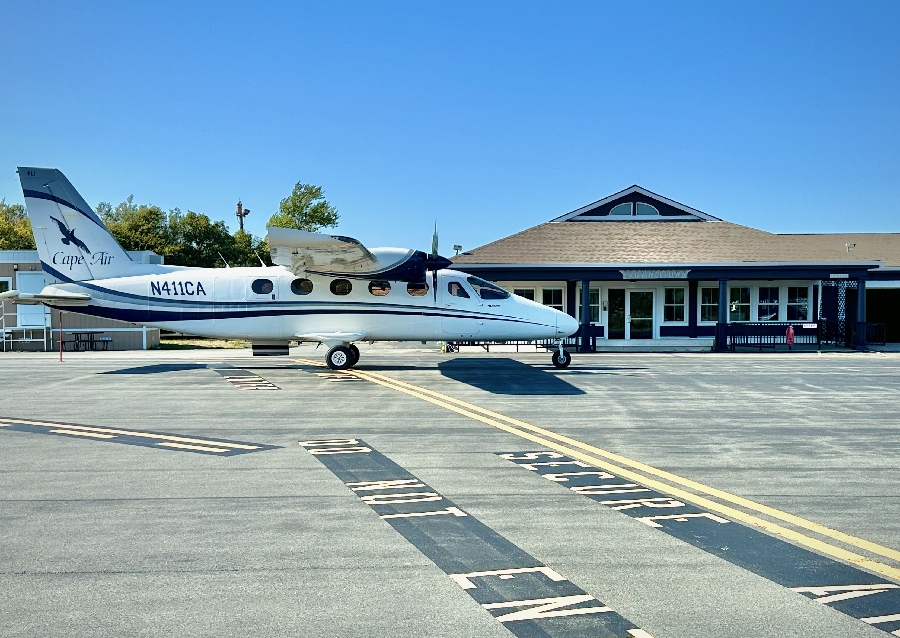PROVINCETOWN — In three weeks, commercial flights between Provincetown and Boston will resume after a six-month hiatus.

Cape Air — the only carrier to offer scheduled flights to Provincetown since the company was founded in 1989 — announced just before Labor Day last year that it would operate here only seasonally. The last Cape Air flight left on Nov. 4; service will resume on May 16.
The company announced last week that in addition to offering up to 11 flights a day this summer, it will also resume flights from Provincetown to the Westchester County airport near White Plains, N.Y. beginning June 13.
“We’ll start out with two flights per day from Thursday through Monday” on the White Plains route, said Cape Air’s Aaron Blinka, “though if demand warrants, we may increase the frequency.”
In 2016, only 206 people flew from Provincetown to White Plains on Cape Air from June to September, according to Provincetown Tourism Dept. reports. In 2017 only 87 passengers made the trip. In 2018, the route was canceled entirely because of a shortage of pilots, Provincetown Tourism Director Tony Fuccillo reported; 344 passengers flew to White Plains between June and September 2019.
The passenger counts for the White Plains route are low, especially compared to the months in which Cape Air says it is not profitable to fly the Provincetown-Boston route.
According to airport commission data, in 2016, 2017, and 2019 more people flew from Provincetown to Boston in November alone than in four months of summer service from Provincetown to White Plains.
Between Nov. 1, 2016 and April 30, 2017, a total of 2,075 passengers flew from Provincetown to Boston — more than 10 times the number that flew to White Plains the summer before.
Blinka said that passenger volume isn’t the key to profitability.
“The rule of thumb is that more passengers and full flights do not necessarily equate to profitability,” he said. The White Plains route “can support economically sustainable fares during the summer season,” while during winter in Provincetown, “the fares that the market can support to attract the passenger volume that we carried are simply not commensurate with our costs.”
A Challenge in Boston
Provincetown’s leaders are still focused on securing a year-round carrier who will provide service to Boston in the winter, Airport Manager Billy Juraschek said. The town is preparing to apply for a federal grant through the FAA’s Small Community Air Service Development Program. The application is due this summer, and grants were announced in October last year, said Juraschek.
“They gave out $12 million, but it’s a very competitive program,” he said. Toledo, Ohio won a $1 million grant last October to restore commercial air service after American Airlines cut its last routes there in 2022. Missoula, Mont. was granted $875,000 to pay for a “revenue guarantee” to support year-round service to Chicago.
Provincetown is unlikely to get year-round service back without a similar amount of federal money, Juraschek said; the town isn’t taking steps toward implementing a subsidy of its own. A single grant award can be spent over four years, but the town will likely not know if it’s been selected until very close to the end of Cape Air’s seasonal service in November.
“Fly the Whale is still interested in becoming a year-round carrier here,” Juraschek said. But “the main challenge they have is at the Boston end.”
Although Fly the Whale is primarily a charter company, it offers scheduled service between St. Croix and St. Thomas in the Virgin Islands and between Block Island and Westerly, R.I. At Logan Airport, however, it would need to land its planes at a charter and private aircraft terminal owned by a company called Signature Aviation, Juraschek said, rather than at Terminal C, where Cape Air lands.
Signature charges about $700 per incoming plane, Juraschek said, and Fly the Whale would need to secure a steep discount if it hoped to land there several times a day all year long.
Town officials and state Sen. Julian Cyr held a meeting recently with officials from Massport, the state agency that owns Logan Airport, to highlight issues facing a new carrier, according to both Juraschek and Cyr.
“Outer Cape residents deserve reliable service year-round, not just during the busiest summer weeks,” said Cyr.
Less Maintenance Money
There are long-term maintenance needs at the airport that also depend indirectly on year-round service, Juraschek said. The FAA allocates $1 million per year in so-called entitlement funds for airports that embark at least 10,000 passengers per year, and that money can be spent on a range of projects to keep airports up to date, including runway work, lighting, and safety improvements.
That entitlement funding falls to $150,000 per year for airports that have fewer than 10,000 departing passengers per year, Juraschek said.
Provincetown had between 10,000 and 12,000 departing passengers per year almost every year from 2010 to 2019, according to airport commission data — but that number fell to only 4,198 departures during the pandemic year of 2020 and only partly recovered to 7,224 in 2022 and 7,521 in 2023.
With Cape Air having ended year-round service, there were only 6,902 departing passengers in 2024, Juraschek said.
“The FAA gave some grace years to airports after the pandemic,” he said, so the town still got the larger funding amount in 2022 and 2023.
That money is set aside at the FAA for future projects, Juraschek said — but over time, local taxpayers could bear a larger share of airport maintenance costs if the town can’t restore winter service and get total passenger numbers back over 10,000.



